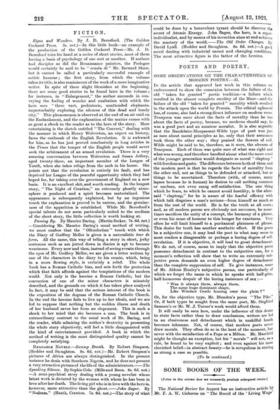POETS AND POETRY.
SOME OBSERVATIONS ON THE CHARACTERISTICS OF MODERN POETRY.—II.
Ix the article that appeared last week in this column we endeavoured to show the connexion between the failure of the old " taken for granted " poetic tradition—a failure which resulted in the almost complete sterility of the Museand the failure of the old " taken for granted " morality which resulted in the attack upon the world by Prussia. The ethical upheaval has, of course, also had a strong direct influence on modern verse. Tennyson was surer about the facts of morality than he was about the facts of poetry, because, we moderns should say, be was a good poet and an amateur moralist. It is also arguable that the Baudelaire-Maupassant-Wilde type of poet was just as sure about moral principles as he, only that their assurance took them the other way ; they praised the flowers of evil. Wilde might be said to be, therefore, as it were, the obverse of Tennyson. Each of them was quite sure of what was right and what was wrong, and therefore bandied about what the more cruel of the younger generation would designate as moral " claptrap" with freedom and gusto. The difference between both of them and the modern poet is that he regards the facts of morality from the other end, not as things to be defended or attacked, but as things to be ascertained. Therefore (with, of course, many lapses because he is human) ho desires to call nothing common or unclean, not even smug self-satisfaction. The one thing which he fears, to which ho cannot avoid hostility, is the afore- said " claptrap," for he is aware of the fearful efficacy with which talk disguises a man's notions—from himself as much as from the rest of the world. He is for the truth at all costs ; and, as all modern poems are obviously not successes, he some- times sacrifices the unity of a concept, the harmony of a phrase, or even his sense of humour to this hunger for exactness. Very often he will limit himself to a puritanical plainness of phrase. This desire for truth has another aesthetic effect. If the poem be a subjective one, it may lead the poet to what may seem to most readers a disagreeable or perhaps a boring degree of self- revelation. If it is objective, it will lead to great detachment. We do not, of course, mean to imply that the objective poem possesses detachment in contrast to the subjective one, for a moment's reflection will show that to write an extremely sub- jective poem demands an even higher degree of detachment than the complete suppression of self. To give instances, some of Mr. Aldous Huxley's subjective poems, one particularly of which we forget the name in which he speaks with half-grime half-humorous despair of the boring insistence of sex :— " Was it always there, always there, The same huge dominant shape, Like Windsor Castle leaning over the plain ?"
Or, for the objective type, Mr. Blunden's poem " The Pike." Or, if both types be sought from the same poet, Mr. Siegfried Sassoon's or Mr. W. J. Turner's work would afford them.
It will easily be seen how, under the influence of this desire to state facts rather than to draw conclusions, writers are led to an elusiveness and detachment which in unskilful hands becomes inhuman. Not, of course, that modern poets never draw morals. They often do so in the heat of the moment, but never with the satisfaction of a Pope or a Milton. Mr. Masefield might be thought an exception, but his " morals " will not, as a rule, be found to be very explicit ; and even against his most cherished belief—in abstract beauty—he is scrupulous in stating as strong a case as possible.
(To be continued.)


































 Previous page
Previous page